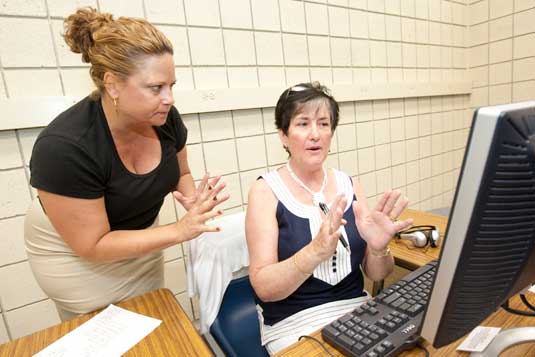New certificate strengthens community college teaching
 Ryan S. Brandenberg / Temple University
|
|
| Participants in Temple’s community college teaching certificate program learn new techniques for integrating digital technology in the classroom. | |
|
An innovative Temple University program is one of the first in the nation to offer a teaching certificate specifically for community college professors. The new initiative offers instructors, already experts in their chosen discipline, an opportunity to improve their classroom effectiveness by learning a variety of new teaching techniques and tools. The program begins at a time when growing numbers of Americans are starting their college studies at two-year colleges, and the institutions are placing increased emphasis on outcomes and assessment. “We heard directly from one of our community college partners about the need for such a program,” explained Pamela Barnett, associate vice provost and director of Temple’s Teaching and Learning Center, who developed the certificate program in conjunction with Temple’s College of Education. The program also made sense for Temple, which in 2010 was ranked ranked 21st nationwide in total number of transfer students by U.S. News and World Report. More than half of those students come from community colleges, largely due to the university’s 11 articulation agreements — formal partnerships with community colleges that make it easier for students to navigate the transfer to Temple. Ginny Carter, the provost of Delaware County Community College, a top source of transfer students to Temple, wanted to offer teacher training to her faculty. “Many faculty come to us with Ph.Ds but without teaching experience,” said Carter. “With student success as our priority and a faculty strongly committed to professional development, we needed to find a way for them to advance their teaching skills.” Unlike other higher education teaching certification programs, Temple’s does not require participants to be enrolled in a degree program. However, the credits earned can be applied to a degree and some of the classes are conveniently offered on the DCCC campus. But of most value to participants is the chance to share experiences and learn alongside community college colleagues who work in the same kind of environments and face similar challenges and issues. Pete Watkins, a human services professor at the Community College of Philadelphia, recently completed the certificate program. “The job we have is challenging because we are working with students who may be underprepared academically and often have busy lives, balancing work, families and school simultaneously,” he said. “The more tools we have as teachers, the better.” One of those tools is the concept of universal design. Applied to teaching, it means using multiple modes of instruction and assessment so that everyone in the class can learn and demonstrate learning, regardless of challenges such as studying in a second language. “We have such a diverse population and because we are open to all, we expect anyone to walk through the door, from the student with very little academic preparation to the student with an advanced degree,” said Diane Picciani, director of the Teaching and Learning Center at DCCC. “A community college teacher needs to understand this and have the flexibility to teach at different levels.” In the end, it all goes back to helping students succeed. “The idea is to prepare students so they can go anywhere to college or move directly into the workforce. We set our standards high,” said Picciani. “A program like this keeps our faculty current. It’s all part of the continuum of well-prepared faculty contributing to continued student success.” Temple’s program is open to all community college professors. Classes are held at DCCC and several Temple campuses. In the fall of 2011, classes will be available online. “Programs like this affirm our relationship and commitment to community colleges,” said Barnett. “Our transfer population is really important and we want to keep finding new ways to support them. |
|